| |
Date |
Event(s) |
| 1 | 1898 | |
| 2 | 1923 | |
| 3 | 1929 | - 1929—1929: Abolition of Poor Law system in Britain
- 1929—1929: Minimum age for a marriage in Britain (which had been 14 for a boy and 12 for a girl)
now 16 for both sexes, with parental consent (or a licence) needed for anyone under 21
- 1929—1929: BBC begins experimental TV transmissions
- 4 Mar 1929—4 Mar 1933:
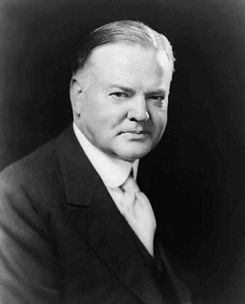 Herbert Hoover U.S. Presidency Herbert Hoover U.S. Presidency
|
| 4 | 1930 | - 1930—1930: First Nazis elected to the German Reichstag
- 1930—1930: Youth Hostel Association (YHA) founded in Britain
- 30 Jan 1930—30 Jan 1930: Hitler becomes chancellor of Germany
- 31 Jan 1930—31 Jan 1930: 3M begins marketing Scotch Tape
- 6 Mar 1930—6 Mar 1930: Clarence Birdseye first marketed frozen peas
- 5 Oct 1930—5 Oct 1930: R101 airship disaster - British abandons airship construction
|
| 5 | 1931 | - 1931—1931: Statute of Westminster: British Dominions become independent sovereign states
- 1931—1931: Collapse of the German banking system; 3,000 banks there close
- 14 Apr 1931—14 Apr 1931: Highway Code first issued
- 26 Apr 1931—26 Apr 1931: Census: Population - England and Wales; 40 Million; Scotland: 4.8 Million; N Ireland: 1.24 Million (Unfortunately, the census was destroyed by fire in WW2)
- 21 Oct 1931—21 Oct 1931: National Government formed to deal with economic crisis - Britain comes off
gold standard
|
| 6 | 1932 | - 1932—1932: Great Hunger March of unemployed to London
- 1932—1932: Moseley founds British Union of Fascists
- 1932—1932: Cockroft and Walton accelerate particles to disintegrate an atomic nucleus
- 1932—1932: Sir Thomas Beecham established the London Philharmonic Orchestra
- 21 May 1932—21 May 1932: Amelia Earhart first solo nonstop flight across Atlantic by a female pilot
- 3 Oct 1932—3 Oct 1932: Iraq gains independence from Britain
- 3 Oct 1932—3 Oct 1932: 'The Times' introduces 'Times New Roman' typeface
|
| 7 | 1933 | - 1933—1933: ICI scientists discover polythene
- 1933—1933: Only 6 pennies minted in Britain this year
- 4 Mar 1933—12 Apr 1945:
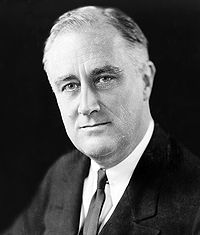 Franklin D. Roosevelt U.S. Presidency Franklin D. Roosevelt U.S. Presidency
- 12 Nov 1933—12 Nov 1933: First known photos of the 'Loch Ness Monster' taken
|
| 8 | 1934 | - 1934—1934: Hitler becomes Fuehrer of Germany
- 18 Jul 1934—18 Jul 1934: King George V opens Mersey Tunnel
- 26 Sep 1934—26 Sep 1934: RMS Queen Mary launched
- 30 Nov 1934—30 Nov 1934: First time a steam locomotive travels at 100 mph ('Flying Scotsman')
|
| 9 | 1935 | - 1935—1935: London adopts a 'Green Belt' scheme
- 1935—1935: Land speed record of 301.13 mph by Malcolm Campbell
- 28 Feb 1935—28 Feb 1935: Nylon first produced by Gerard J. Berchet of Wallace Carothers' research group
at DuPont (there is no evidence to the widely-supposed story that the name derives from
New York-London)
- 12 Mar 1935—12 Mar 1935: Hore-Belisha introduces pedestrian crossings and speed limits for built-up areas
in Britain
- 1 Jun 1935—1 Jun 1935: Voluntary driving tests introduced in UK
- 30 Jul 1935—30 Jul 1935: Penguin paperbacks launched
|
| 10 | 1936 | - 1936—1936: Jet engine first tested
- 20 Jan 1936—20 Jan 1936: George V dies
- 5 May 1936—5 May 1936: First flight of a Spitfire
- 24 Jul 1936—24 Jul 1936: 'Speaking clock' service starts in UK
- 2 Nov 1936—2 Nov 1936: British Broadcasting Corporation initiates the BBC Television Service, world's
first public TV transmission
- 30 Nov 1936—30 Nov 1936: Crystal Palace destroyed by fire
- 5 Dec 1936—5 Dec 1936: Edward VIII abdicates (announced Dec 10) - popular carol that Christmas:
'Hark the Herald Angels sing Mrs Simpson's got our King'
|
| 11 | 1937 | - 1937—1937: '999' emergency telephone call facility starts in London
- 1937—1937: Billy Butlin opens his first holiday camp
- 12 Apr 1937—12 Apr 1937: Frank Whittle ground-tests the first jet engine designed to power an aircraft
- 12 May 1937—12 May 1937: Coronation of King George VI
- 28 May 1937—28 May 1937: Neville Chamberlain becomes Prime Minister - policy of appeasement towards
Hitler
- 3 Jun 1937—3 Jun 1937: Duke of Windsor marries Wallis Simpson
- 4 Dec 1937—4 Dec 1937: 'The Dandy' first published
|
| 12 | 1938 | - 1938—1938: Principle of paid holidays established in Britain
- 1938—1938: HMS Rodney first ship to be equipped with radar
- 1938—1938: First practical ball-point pen produced by Hungarian journalist, Lajos Biro
- 12 Mar 1938—12 Mar 1938: Germany invades and annexes Austria
- 3 Jul 1938—3 Jul 1938: 'Mallard' reaches 126 mph (203 km/h); still world record for a steam locomotive
- 27 Sep 1938—27 Sep 1938: Largest ocean liner ever built, Queen Elizabeth launched on Clydebank
- 29 Sep 1938—29 Sep 1938: Chamberlain visits Hitler in Munich - promises 'peace in our time'
- 30 Oct 1938—30 Oct 1938: Orson Welles broadcasts his radio play of HG Wells 'The War of the Worlds', causing panic in the USA
|
| 13 | 1939 | - 1939—1939: Germany annexes Czechoslovakia
- 1939—1939: Start of evacuation of women and children from London
- 1939—1939: Coldest winter in Britain since 1894, though this could not be publicised at the time
- 1 Sep 1939—1 Sep 1939: Germany invades Poland
- 1 Sep 1939—2 Sep 1945:
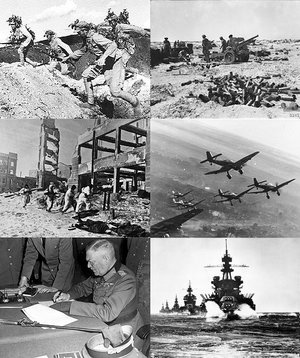 World War II World War II
- 3 Sep 1939—3 Sep 1939: Britain and France declare war on Germany
- 6 Sep 1939—6 Sep 1939: First air-raid on Britain
- 11 Sep 1939—11 Sep 1939: British Expeditionary Force (BEF) sent to France
- 14 Oct 1939—14 Oct 1939: HMS Royal Oak sunk in Scapa Flow with loss of 810 lives
- 7 Dec 1939—7 Dec 1939: 'First flight' of Canadian troops sail for Britain - 7,400 men on 5 ships
- 17 Dec 1939—17 Dec 1939: 'Admiral Graf Spee' scuttled outside Montevideo
|
| 14 | 1940 | - 1 Apr 1940—1 Apr 1940: BOAC starts operations, replacing Imperial and British Airways Ltd
- 11 May 1940—11 May 1940: National Government formed under Churchill
- 13 May 1940—13 May 1940: Germany invades France
- 27 May 1940—27 May 1940: Start of the evacuation of the British Army at Dunkirk (27 May - 4 Jun)
- 25 Jun 1940—25 Jun 1940: Fall of France to Germany
- 7 Sep 1940—7 Sep 1940: Germany launches bombing blitz on Britain, the first of 57 consecutive nights of
bombing
- 15 Sep 1940—15 Sep 1940: Battle of Britain: massive waves of German air attacks decisively repulsed by the
RAF - Hitler postpones invasion of Britain
- 14 Nov 1940—14 Nov 1940: Coventry heavily bombed and the Cathedral almost completely destroyed
|
| 15 | 1941 | - 1941—1941: Britain introduces severe rationing
- 1941—1941: First British jet aircraft flies, based on work of Whittle
- 1941—1941: Bailey invents his portable military bridge
- 1941—1941: First use of antibiotics
- 10 May 1941—10 May 1941: Rudolf Hess flies to Scotland
- 27 May 1941—27 May 1941: 'Bismark' sunk
- 22 Jun 1941—22 Jun 1941: Germany invades Russia (Operation Barbarossa)
- 1 Jul 1941—1 Jul 1941: First Canadian armoured regiments arrive in Britain
- Dec 1941—Dec 1941: Canadian forces given operation role in defending south coast of England
- Dec 1941—Dec 1941: 'Manhattan Project' of nuclear research begins in America
- 7 Dec 1941—7 Dec 1941: Japan attackes US fleet at Pearl Harbour
- 8 Dec 1941—8 Dec 1941: USA enters WWII
- 24 Dec 1941—24 Dec 1941: Hong Kong falls to the Japanese
|
| 16 | 1942 | - 1942—1942: Invention of world's first programmable computer by Alan Turing in co-operation with
Max Neumann - used to crack German codes
- 1942—1942: Gilbert Murray founds Oxfam
- 30 May 1942—30 May 1942: Over 1,000 allied bombers raid Cologne
- 4 Jun 1942—4 Jun 1942: Battle of Midway
- 19 Aug 1942—19 Aug 1942: Abortive raid on Dieppe, largely by Canadian troops
- 6 Sep 1942—6 Sep 1942: Germans defeated at Stalingrad
- 3 Oct 1942—3 Oct 1942: First successful launch of V2 rocket in Germany - first man-made object to reach
space
- 23 Oct 1942—23 Oct 1942: Battle of El Alamein - Montgomery defeats Rommel
- 2 Dec 1942—2 Dec 1942: 'Manhattan Project' - a team led by Enrico Fermi initiates the first self-sustaining
nuclear chain reaction
|
| 17 | 1943 | - 1943—1943: Round-the-clock bombing of Germany begins
- 16 May 1943—16 May 1943: 'Dam Buster' raids on Ruhr dams by RAF
- 24 Jul 1943—24 Jul 1943: Allies invade Italy - Benito Mussolini resigns as Italian Dictator, 24 July
|
| 18 | 1944 | - 6 Apr 1944—6 Apr 1944: PAYE income tax begins
- 4 Jun 1944—4 Jun 1944: Allies enter Rome
- 6 Jun 1944—6 Jun 1944: D-Day invasion of Normandy
- 12 Jun 1944—12 Jun 1944: First V1 flying bombs hit London
- 8 Sep 1944—8 Sep 1944: First V2 rocket bombs hit London
- 11 Sep 1944—11 Sep 1944: Allies enter Germany
- 16 Dec 1944—16 Dec 1944: Battle of the Bulge: German counter-offensive
|
| 19 | 1945 | - 4 Feb 1945—4 Feb 1945: Yalta Conference between Churchill, Roosevelt and Stalin
- 29 Mar 1945—29 Mar 1945: Last V1 flying bomb attack
- 12 Apr 1945—20 Jan 1953:
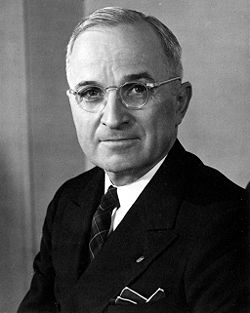 Harry S. Truman U.S. Presidency Harry S. Truman U.S. Presidency
- 25 Apr 1945—25 Apr 1945: Berlin surrounded by Russian troops
- 30 Apr 1945—30 Apr 1945: Hitler commits suicide
- 8 May 1945—8 May 1945: VE Day (Victory in Europe)
- 9 May 1945—9 May 1945: Channel Islands liberated
- 26 Jun 1945—26 Jun 1945: UN Charter signed in San Francisco
- 16 Jul 1945—16 Jul 1945: First ever atomic bomb exploded in a test in New Mexico (although there were
other forms of atomic device before that, such as the Pile at Stagg Field, first critical on
2nd Dec 1942)
- 26 Jul 1945—26 Jul 1945: Labour win UK General Election - Churchill out of office
- 29 Jul 1945—29 Jul 1945: BBC Light Programme starts
- 6 Aug 1945—6 Aug 1945: Atomic bomb dropped on Hiroshima
- 9 Aug 1945—9 Aug 1945: Atomic bomb dropped on Nagasaki
- 15 Aug 1945—15 Aug 1945: VJ Day (Victory in Japan)
- 2 Sep 1945—2 Sep 1945: Japanese surrender signed aboard USS Missouri
- 24 Oct 1945—24 Oct 1945: United Nations Organisation comes into existence
- 4 Nov 1945—4 Nov 1945: UNESCO founded
|
| 20 | 1946 | - 1946—1946: Transition to National Health Service starts in Britain (came into being 5th July 1948)
- 1946—1946: Alistair Cooke starts his regular 'Letter from America' on BBC radio - until 2004
- 1 Jan 1946—1 Jan 1946: First civillian flight from Heathrow Airport
- 1 Mar 1946—1 Mar 1946: Bank of England nationalised
|
| 21 | 1947 | - 1947—1947: Most severe winter in Britain for 53 years at start of the year - heavy snow and much
flooding later
- 1947—1947: First British nuclear reactor developed
- 1 Jan 1947—1 Jan 1947: Coal Mines nationalised
- 23 Feb 1947—23 Feb 1947: International Organization for Standardization (ISO) founded
- 1 Mar 1947—1 Mar 1947: International Monetary Fund begins financial operations
- 1 Apr 1947—1 Apr 1947: School leaving age raised to 15 in Britain
- 26 Oct 1947—26 Oct 1947: British military occupation ends in Iraq
- 20 Nov 1947—20 Nov 1947: Marriage of Princess Elizabeth (later Elizabeth II) and Philip Mountbatten in
Westminster Abbey
|
| 22 | 1948 | - 1948—1948: British Citizenship Act : all Commonwealth citizens qualify for British passports
- 1948—1948: Transistor radio invented
- 1948—1948: Long-playing record (LP) invented by Goldmark
- 1 Jan 1948—1 Jan 1948: British Railways nationalised
- 5 Jul 1948—5 Jul 1948: National Health Service (NHS) begins in Britain
- 29 Jul 1948—29 Jul 1948: London Olympics begin
|
| 23 | 1949 | - 1949—1949: Maiden flight of the Bristol Brabazon (broken up in 1953 for scrap)
- 1949—1949: De Haviland produces the Comet - first jet airliner
- 15 Mar 1949—15 Mar 1949: Clothes rationing ends in Britain
- 4 Apr 1949—4 Apr 1949: Twelve nations sign The North Atlantic Treaty creating NATO
|
| 24 | 1950 | - 19 May 1950—19 May 1950: Points rationing ends in Britain
- 26 May 1950—26 May 1950: Petrol rationing ends in Britain
- 25 Jun 1950—27 Jul 1953:
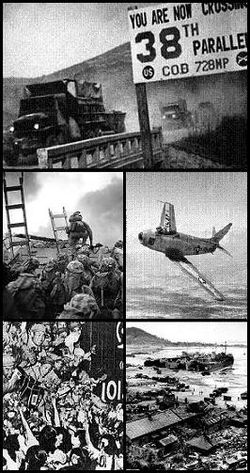 Korean War Korean War
- 11 Jul 1950—11 Jul 1950: 'Andy Pandy' first seen on BBC TV
- 9 Sep 1950—9 Sep 1950: Soap rationing ends in Britain
- 28 Dec 1950—28 Dec 1950: The Peak District becomes the Britain's first National Park
|
| 25 | 1951 | - 3 May 1951—3 May 1951: Festival of Britain and Royal Festival Hall open on South Bank, London
- 28 May 1951—28 May 1951: First Goon Show broadcast
- 20 Dec 1951—20 Dec 1951: Electricity first produced by nuclear power, from Experimental Breeder Reactor
|
| 26 | 1952 | - 1952—1952: Contraceptive pill invented
- 1952—1952: Britain explodes her first atomic bomb, in Australia
- 1952—1952: Radioactive carbon used for dating prehistoric objects
- 1952—1952: Bonn Convention: Britain, France and USA end their occupation of West Germany
- 6 Feb 1952—6 Feb 1952: King George VI dies
- 21 Feb 1952—21 Feb 1952: Identity Cards abolished in Britain
- 2 May 1952—2 May 1952: First commercial jet airliner service launched, by BOACComet between London
and Johannesburg
- 5 Jul 1952—5 Jul 1952: Last tram runs in London (Woolwich to New Cross)
- 16 Aug 1952—16 Aug 1952: Lynmouth (North Devon) flood disaster
- 6 Sep 1952—6 Sep 1952: DH110 crashes at Farnborough Air Show, 26 killed
- 3 Oct 1952—3 Oct 1952: End of tea rationing in Britain
- 1 Nov 1952—1 Nov 1952: The first H-bomb ever ('Mike') was exploded by the USA - the mushroom cloud
was 8 miles across and 27 miles high. The canopy was 100 miles wide. Radioactive mud fell
out of the sky followed by heavy rain. 80 million tons of earth was vaporised.
- 25 Nov 1952—25 Nov 1952: Agatha Christie's 'The Mousetrap' opens in London
- 4 Dec 1952—4 Dec 1952: Great smog hits London
|
| 27 | 1953 | - 20 Jan 1953—20 Jan 1961:
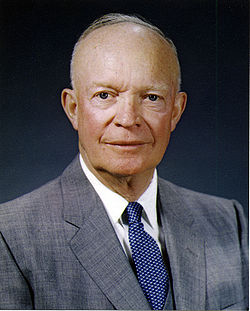 Dwight D. Eisenhower U.S. Presidency Dwight D. Eisenhower U.S. Presidency
- 31 Jan 1953—31 Jan 1953: Said to be the biggest civil catastrophe in Britain in the 20th century -
severe storm and high tides caused the loss of hundreds of lives - - effects travelled from the
west coast of Scotland round to the south-east coast of England [The Netherlands were even
worse affected with over a thousand deaths]
- 5 Feb 1953—5 Feb 1953: Sweet rationing ends in Britain
- 5 Mar 1953—5 Mar 1953: Death of Stalin
- 26 Mar 1953—26 Mar 1953: Jonas Salk announces his polio vaccine
- 24 Apr 1953—24 Apr 1953: Winston Churchill knighted
- 25 Apr 1953—25 Apr 1953: Francis Crick and James D Watson publish the double helix structure of DNA
- 2 Jun 1953—2 Jun 1953: Coronation of Elizabeth II
- 26 Sep 1953—26 Sep 1953: Sugar rationing ends in Britain (after nearly 14 years)
|
| 28 | 1954 | - 1954—1954: First comprehensive school opens in London
- 1954—1954: Routemaster bus starts operating in London
- 1954—1954: First transistor radios sold
- 6 May 1954—6 May 1954: First sub 4 minute mile (Roger Bannister, 3 mins 59.4 secs)
- 3 Jul 1954—3 Jul 1954: Food rationing officially ends in Britain
- 5 Jul 1954—5 Jul 1954: BBC broadcasts its first television news bulletin
- 30 Sep 1954—30 Sep 1954: First atomic powered sumbmarine USS Nautilus commissioned
|
| 29 | 1955 | - 1955—1955: 'Mole' self-grip wrench patented by Thomas Coughtrie of Mole & Sons
- 27 Jul 1955—27 Jul 1955: Jul 27: Allied occupation of Austria (after WW2) ends
- 22 Sep 1955—22 Sep 1955: Commercial TV starts in Britain
|
| 30 | 1956 | - 1956—1956: Britain constructs world's first large-scale nuclear power station in Cumberland
- 1 Mar 1956—1 Mar 1956: Radiotelephony spelling alphabet introduced (Alpha, Bravo, etc)
- 17 Apr 1956—17 Apr 1956: Premium Bonds first launched - first prizes drawn on 1 Jun 1957
- 3 Jun 1956—3 Jun 1956: 3rd class travel abolished on British Railways (renamed 'Third Class' as 'Second
Class', which had been abolished in 1875 leaving just First and Third Class)
- 31 Oct 1956—31 Oct 1956: Britain and France invade Suez
|
| 31 | 1957 | - 1957—1957: Britain introduces parking meters
- 1957—1957: Helvetica typeface developed (in Switzerland)
- 11 Jan 1957—11 Jan 1957: Harold Macmillan becomes Prime Minister
- 14 May 1957—14 May 1957: Post-Suez petrol rationing ends
- 15 May 1957—15 May 1957: Britain explodes her first hydrogen bomb, at Christmas Island
- 25 May 1957—25 May 1957: Treaty of Rome to create European Economic Community (EEC) of six
countries: France, West Germany, Italy, Belgium, Holland and Luxembourg - became
operational Jan 1958
- 4 Dec 1957—4 Dec 1957: Lewisham rail disaster - 90 killed as two trains collide in thick fog and a viaduct
collapses on top of them
- 25 Dec 1957—25 Dec 1957: Queen's first Christmas TV broadcast
|
| 32 | 1958 | - 1958—1958: Easter: First anti-nuclear protest march to Aldermaston (emergence of CND)
- 1958—1958: Computers begin to be used in research, industry and commerce
- 1958—1958: USA begins to produce Inter-Continental Ballistic Missiles (ICBMs)
- 13 May 1958—13 May 1958: Velcro trade mark registered
- 26 Jul 1958—26 Jul 1958: Prince Charles' Investiture as 'Prince of Wales'
- 5 Dec 1958—5 Dec 1958: Inauguration of Subscriber Trunk Dialling (STD) in Britain (completed in 1979)
- 5 Dec 1958—5 Dec 1958: Preston by-pass opens - UK's first stretch of motorway
|
| 33 | 1959 | - 3 Feb 1959—3 Feb 1959: 'The Day The Music Died' - plane crash kills Buddy Holly, Ritchie Valens, and
The Big Bopper
- 17 Feb 1959—17 Feb 1959: Vanguard 2 satellite launched - first to measure cloud-cover distribution
- 24 May 1959—24 May 1959: Empire Day becomes Commonwealth Day
- Aug 1959—Aug 1959: BMC Mini car launched
- 26 Sep 1959—30 Apr 1975:
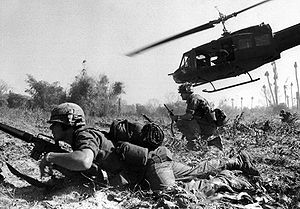 Vietnam War Vietnam War
- 3 Oct 1959—3 Oct 1959: Postcodes introduced in Britain
- 1 Nov 1959—1 Nov 1959: First section of M1 motorway opened
|
| 34 | 1960 | - 17 Mar 1960—17 Mar 1960: New ?1 notes issued by Bank of England
- 18 Mar 1960—18 Mar 1960: Last steam locomotive of British Railways named
- 21 Jul 1960—21 Jul 1960: Francis Chichester arrives in New York aboard Gypsy Moth II (took 40 days),
winning the first single-handed transatlantic yacht race which he co-founded
- 12 Aug 1960—12 Aug 1960: Echo I, the first (passive) communications satellite, launched
- 12 Sep 1960—12 Sep 1960: MoT tests on motor vehicles introduced
- 1 Oct 1960—1 Oct 1960: HMS 'Dreadnought' nuclear submarine launched
- 2 Nov 1960—2 Nov 1960: Penguin Books found not guilty of obscenity in the 'Lady Chatterley's Lover' case
|
| 35 | 1961 | - 1 Jan 1961—1 Jan 1961: Farthing ceases to be legal tender in UK
- 20 Jan 1961—22 Nov 1963:
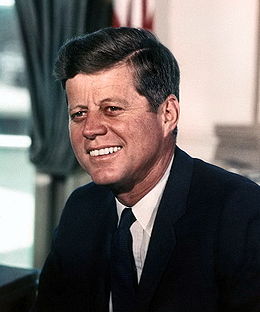 John F. Kennedy U.S. Presidency John F. Kennedy U.S. Presidency
- 13 Mar 1961—13 Mar 1961: Black & White ?5 notes cease to be legal tender
- 14 Mar 1961—14 Mar 1961: New English Bible (New Testament) published
- 1 May 1961—1 May 1961: Betting shops legal in Britain
|
| 36 | 1962 | - 1962—1962: Britain passes Commonwealth Immigrants Act to control immigration
- 1962—1962: Thalidomide withdrawn after it causes deformities in babies
- 1962—1962: Britain and France agree to construct 'Concorde'
- 25 May 1962—25 May 1962: Consecration of new Coventry Cathedral (old destroyed in WW2 blitz)
- 15 Jun 1962—15 Jun 1962: First nuclear generated electricity to supplied National Grid (from Berkeley Glos)
- Jul 1962—Jul 1962: First passenger-carrying hovercraft enters service, along the North Wales Coast from Moreton to Rhyl
- 10 Jul 1962—10 Jul 1962: First TV transmission between US and Europe (Telstar) - first live broadcast on 23 Jul
- 24 Oct 1962—24 Oct 1962: Cuba missile crisis - brink of nuclear war
|
| 37 | 1963 | - 1963—1963: France vetoes Britain's entry into EEC
- Jan 1963—Jan 1963: Cold weather forces cancellation of most football matches (only 4 English First Division matches in the month) - the first 'pools panel' created
- 27 Mar 1963—27 Mar 1963: Beeching Report on British Railways (the 'Beeching Axe')
- 1 Aug 1963—1 Aug 1963: Minimum prison age raised to 17
- 8 Aug 1963—8 Aug 1963: 'Great Train Robbery' on Glasgow to London mail train
- 17 Sep 1963—17 Sep 1963: Fylingdales (Yorks) early warning system operational
- 18 Nov 1963—18 Nov 1963: Dartford Tunnel opens
- 22 Nov 1963—20 Jan 1969:
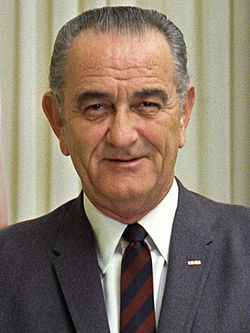 Lyndon B. Johnson U.S. Presidency Lyndon B. Johnson U.S. Presidency
- 23 Nov 1963—23 Nov 1963: First episode of 'Dr Who' on BBC TV
|
| 38 | 1964 | - 1 Jan 1964—1 Jan 1964: First 'Top of the Pops' on BBC TV
- 9 Apr 1964—9 Apr 1964: First Greater London Council (GLC) election
- 21 Apr 1964—21 Apr 1964: BBC2 TV launched
- 22 Aug 1964—22 Aug 1964: 'Match of the Day' starts on BBC2
- 4 Sep 1964—4 Sep 1964: Forth road bridge opens
|
| 39 | 1965 | - 1965—1965: Britain enacts first Race Relations Act
- 7 Feb 1965—7 Feb 1965: First US raids against North Vietnam
- 7 Apr 1965—7 Apr 1965: Winston Churchill dies
- 1 Aug 1965—1 Aug 1965: TV cigarette advertising banned in Britain
- 8 Oct 1965—8 Oct 1965: Post Office Tower operational in London
- 28 Oct 1965—28 Oct 1965: Death penalty for murder suspended in Britain for five-year trial period, then
abolished 18 Dec 1969
- 22 Dec 1965—22 Dec 1965: 70mph speed limit introduced on British roads
|
| 40 | 1966 | - 14 Feb 1966—14 Feb 1966: Australia converts from ? to $
- 3 May 1966—3 May 1966: 'The Times' begins to print news on its front page in place of classified
Advertisements
- 30 Jul 1966—30 Jul 1966: World Cup won by England at Wembley (4-2 in extra time v West Germany)
- 8 Sep 1966—8 Sep 1966: First Severn road bridge opens
- 21 Oct 1966—21 Oct 1966: Aberfan disaster - slag heap slip kills 144, incl. 116 children
- 1 Dec 1966—1 Dec 1966: First Christmas stamps issued in Britain
|
| 41 | 1967 | - 4 Jan 1967—4 Jan 1967: Donald Campbell dies attempting to break his world water speed record on
Conniston Water - his body and Bluebird recovered in 2002
- 18 Mar 1967—18 Mar 1967: 'Torrey Canyon' oil tanker runs aground off Lands End first major oil spill
- 28 May 1967—28 May 1967: Francis Chichester arrives in Plymouth after solo circumnavigation in Gipsy Moth IV (he was knighted 7th July at Greenwich by the queen using the sword with which Elizabeth I had knighted Sir Francis Drake four centuries earlier
- 27 Jun 1967—27 Jun 1967: First withdrawal from a cash dispenser (ATM) in Britain - at Enfield branch of Barclays
- 1 Jul 1967—1 Jul 1967: First colour TV in Britain
- 14 Aug 1967—14 Aug 1967: Offshore pirate radio stations declared illegal by the UK
- 20 Sep 1967—20 Sep 1967: 'QE2' launched on Clydebank
- 27 Sep 1967—27 Sep 1967: 'Queen Mary' arrives Southampton at end of her last transatlantic voyage
- 30 Sep 1967—30 Sep 1967: BBC Radios 1 2 3 & 4 open first record played on Radio 1 was the controversial 'Flowers in the Rain' by 'The Move'
- 5 Oct 1967—5 Oct 1967: Introduction of majority verdicts in English courts
|
| 42 | 1968 | - 18 Feb 1968—18 Feb 1968: British Standard Time introduced - Summer Time became permanent but arguments prevailed and Britain reverted to GMT in October 1971
- 18 Apr 1968—18 Apr 1968: London Bridge sold (and eventually moved to Arizona) - modern London Bridge, built around it as it was demolished, was opened in Mar 1973
- 20 Apr 1968—20 Apr 1968: Enoch Powell 'Rivers of Blood' speech on immigration
- 23 Apr 1968—23 Apr 1968: Issue of 5p and 10p decimal coins in Britain
- 29 May 1968—29 May 1968: Manchester United first English club to win the European Cup
- 11 Aug 1968—11 Aug 1968: Last steam passenger train service ran in Britain (Carlisle- Liverpool)
- 16 Sep 1968—16 Sep 1968: Two-tier postal rate starts in Britain
- 5 Oct 1968—5 Oct 1968: Beginning of disturbances in N Ireland
|
| 43 | 1969 | - 20 Jan 1969—9 Aug 1974:
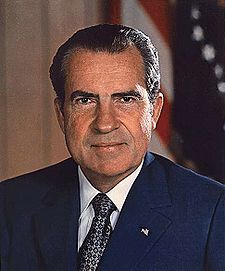 Richard Nixon U.S. Presidency Richard Nixon U.S. Presidency
- 2 Mar 1969—2 Mar 1969: Maiden flight of 'Concorde', at Toulouse
- 7 Mar 1969—7 Mar 1969: Victoria Line tube opens in London
- 17 Apr 1969—17 Apr 1969: Voting age lowered from 21 to 18
- 2 May 1969—2 May 1969: Maiden voyage of liner Queen Elizabeth 2 (QE2)
- 20 Jul 1969:
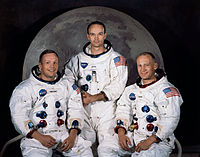 Apollo 11 Moon Landing Apollo 11 Moon Landing
- 31 Jul 1969—31 Jul 1969: Halfpenny ceases to be legal tender in Britain
- 14 Aug 1969—14 Aug 1969: Civil disturbances in Ulster - Britain sends troops to support civil authorities
- 7 Sep 1969—7 Sep 1969: First episode of 'Monty Python's Flying Circus' recorded
- 14 Oct 1969—14 Oct 1969: 50p coin introduced in Britain (reduced in size 1998)
|
| 44 | 1970 | - 1970—1970: Boeing 747 (Jumbo jet) goes into service
- 17 Jun 1970—17 Jun 1970: Decimal postage stamps first issued for sale in Britain
- 19 Jun 1970—19 Jun 1970: Edward Heath becomes Prime Minister
- 30 Jul 1970—30 Jul 1970: Damages awarded to Thalidomide victims
- 19 Sep 1970—19 Sep 1970: First Glastonbury Festival held
- 20 Nov 1970—20 Nov 1970: Ten shilling note (50p after decimalisation) goes out of circulation in Britain
|



 Submit Photo / Document
Submit Photo / Document
